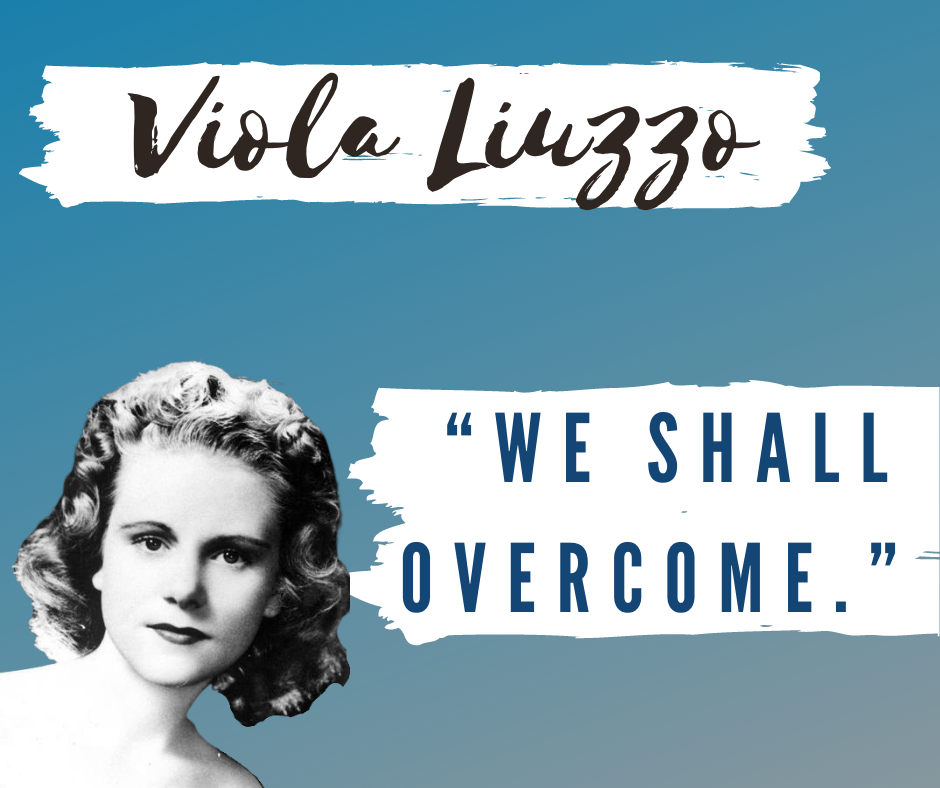Last month we celebrated an icon of civil rights, John Lewis, and recounted the events of one of the most horrifying examples of voter suppression. For Women’s History Month, we honor an incredible woman in our history, and her story takes us back to that tragic day on the Edmund Pettus Bridge.
Born in Pennsylvania on April 11, 1925, Viola Liuzzo (at this time, Viola Gregg) was raised in poverty in Georgia and Tennessee during the Great Depression. As a young adult, Liuzzo moved to Michigan to attend Wayne State University. Almost as soon as she arrived in Detroit, Liuzzo became active in the NAACP’s Detroit chapter. Detroit is also where she would meet and fall in love with her soon-to-be husband, Anthony Liuzzo. The two would marry in 1950. Just a few short years later, Liuzzo was now a middle-class mother of five children.
On the evening of March 7, 1965, the Liuzzo family turned on their television just in time to see the news footage of hundreds of peaceful protesters being clubbed and tear-gassed by police on the Edmund Pettus Bridge. Heartbroken and determined to take action, Liuzzo participated in a protest at Wayne State. She then answered the call to action from Dr. Martin Luther King Jr. for people of all faiths to come and help. She drove 800 miles to Selma, Alabama, intending to march for civil rights with the Southern Christian Leadership Conference. Liuzzo helped organize and participated in the Selma to Montgomery Marches.
On March March 25, she drove 19-year-old Leroy Moton, an African American, to Montgomery when a car carrying four Klu Klux Klan members began speeding after them. It wasn’t long before the KKK members’ car pulled up alongside Liuzzo’s. Seconds later, they shot her in the head, killing her instantly—Moton, who was not hit, survived by playing dead. The next day, President Lyndon B. Johnson went on television to announce the arrests of the KKK members – Eugene Thomas, Collie Leroy Wilkins, Jr., William Orville Eaton, and Gary Thomas Rowe – and demanded an immediate Congressional investigation of the KKK. All four of the men would be acquitted in the Alabama courts despite eyewitness testimony and ballistics evidence. They would, however, be found guilty of violating Viola Liuzzo’s civil rights by a federal grand jury and sentenced to ten years in prison.
Liuzzo’s funeral in Detroit was attended by many dignitaries, including Dr. Martin Luther King, Jr. and Walter Reuther. Yet after her death, her reputation was slandered, as false accusations were made about her morality, dedication to her family, and drug use. In 1978, documents released through the Freedom of Information Act revealed that FBI Director J. Edgar Hoover masterminded the smear campaign, fearful of the FBI’s culpability of informant Gary Rowe in the murder. Liuzzo’s children were threatened and taunted, and a cross was burned on their lawn, prompting the need for an around-the-clock guard for the next two years.
A martyr of the Civil Rights Movement, Liuzzo’s death was not in vain. Despite the efforts to discredit Liuzzo, her murder led to an investigation into the Ku Klux Klan ordered directly by President Johnson. It is also believed that her death sparked legislators to pass the Voting Rights Act of 1965. Viola Liuzzo is a hero and an endless source of inspiration. Liuzzo put wheels under democracy by driving others to speak out and be voices for their fundamental rights. At the core of the Rideshare2Vote mission is to remove barriers to participating in democracy especially given the systemic racism prevalent in voting laws. At Rideshare2Vote, we aim to help change that one drive at a time. Join us as a volunteer and help Rideshare2Vote ensure that every vote counts and that every voice is heard.

